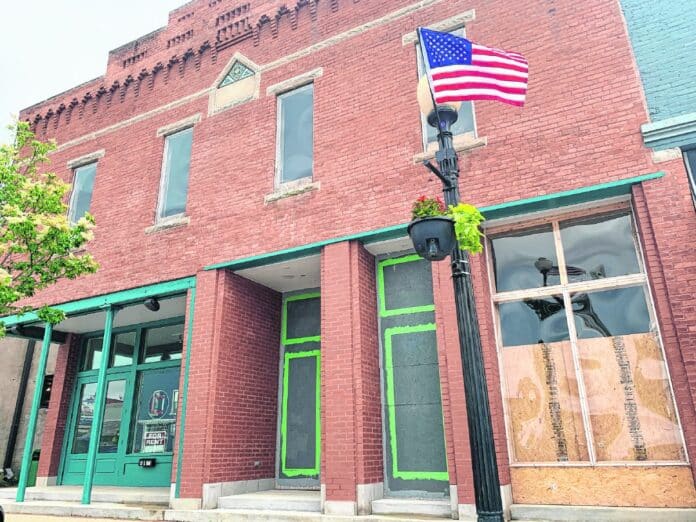
FORTVILLE — A judge has ordered a Fortville town councilman to explain why he shouldn’t be held in contempt after disregarding a court order to bring a commercial building he owns into compliance with town rules.
The councilman contends his property meets those regulations and that he’s being unfairly singled out.
Plywood or other materials boarding windows and doors on vacant structures in Fortville must be replaced with secure doors or glazed windows within six months, a town ordinance states. According to Fortville officials, the building at 108-110 S. Main St. has not been in compliance with that rule for almost two years, since the town first alerted its property owners. G. Lenzy Hendrix Jr., a Fortville town councilman, bought the two-story downtown property from Roger Tappy under a land contract.
[sc:text-divider text-divider-title=”Story continues below gallery” ]
Fortville notified Hendrix and Tappy by letter in August 2017 of the need to bring the building into compliance by February 2018. However, the town contends the building remained out of compliance after an April 2018 letter and a final notice in June of that year.
Represented by attorneys Alex Intermill and Bradley Dick of Indianapolis-based Bose McKinney & Evans, Fortville filed a complaint against Hendrix and Tappy in Hancock Superior Court 2 in September 2018. About a month after a January 2019 bench trial, Court Commissioner Cody Coombs issued an order requiring Hendrix and Tappy to bring the building into compliance within 30 days.
Fortville filed a petition in the case in late May indicating that three windows and what appears to be a door on the front of the building remain boarded up. Transparent thermoplastic was installed in several other windows on the property, the petition states, adding that continues to violate the town ordinance, which requires glazed windows.
A window on the rear of the building was “covered with some kind of plastic,” the petition continues.
On June 9, that window appeared to be covered with a vent.
Coombs issued an order on June 3 requiring Hendrix and Tappy to appear in court at 1:30 p.m. on July 16 “to show cause why they should not be held in indirect civil contempt…” and that their failure to comply with the order might result in their “arrest, possible fine and imprisonment…”
Judy Hester, an attorney with Indianapolis-based Brazill Hester who represents Hendrix and Tappy in the case, maintained in emails to the Daily Reporter that the building currently complies with the town’s interpretation of the ordinance.
“All windows were previously replaced in a manner that we believe conforms to the ordinance and the court order,” Hester wrote. “The court will decide whether or not that is the case.”
Hendrix and Tappy pointed out in a brief they filed in the case after the January bench trial that the building had boarded-up windows before the related town ordinance was enacted in June 2017. They argued that because the building’s lawful condition existed before the ordinance was enacted, it should be allowed to continue afterward.
“The property in question had sealed windows artistically painted with faux windows prior to the ordinance being written, and it is our experience that such a situation would lead to the property being considered grandfathered as compliant,” Hester wrote in an email.
Hendrix and Tappy also argued in their brief that the ordinance only applies to residential properties and that the property is in substantial compliance with the intent of the ordinance, which is to prevent blight.
Hendrix has invested $280,000 into the property, “with a significant portion being in the windows and doors that are the focus of the ordinance,” according to the brief. An upgraded facade and the installation of four new doors along with a display window and other storefront work is part of that investment, the brief continues. Faux windows were installed to accommodate customization for future tenants, the brief states.
The property owners also argued in their January 2019 brief that the town has only enforced the ordinance on residential properties and cites “a plethora of commercial buildings with plywood windows and doors that have been in place for well over six months” in town.
One of Fortville’s briefs in the case recalls town planning administrator Adam Zaklikowski’s testimony that he received a complaint about Hendrix and Tappy’s building and chose to enforce the ordinance because of its “prominent location on Main Street in downtown Fortville.”
The town also argued that the ordinance does not only apply to residential buildings and that it’s a “health, safety and welfare ordinance,” not a zoning regulation that permits grandfathered conditions. All of the work done to the property does not excuse it from complying with the rules regarding boarded-up windows, the brief also states.
The Fortville Town Council passed the ordinance regarding boarded-up windows and doors 4-0 in June 2017. Hendrix was in office at that time but was absent from the meeting, according to meeting minutes.
“It is our opinion that the ordinance written was specifically aimed at Mr. Hendrix because of his outspoken political stands…” Hester said in an email on Tuesday. Hendrix has frequently been at odds with his fellow council members on a variety of town issues.
Fortville’s attorneys could not be reached for comment by press time Tuesday.
According to the ordinance regulating boarded-up windows and doors, a violation is subject to a $100 penalty with $10 per day for each day of noncompliance up to maximum of $2,500.
The town told Hendrix and Tappy in a letter that if it’s “forced to bring further legal action to bring the building into full compliance…,” then the town “will seek its costs, attorneys’ fees and all other relief provided for by Indiana law and Fortville’s ordinances.”




